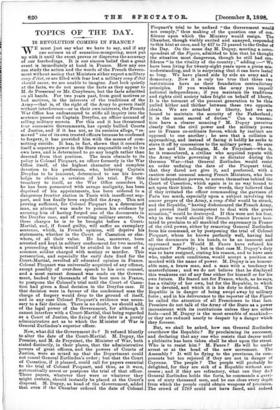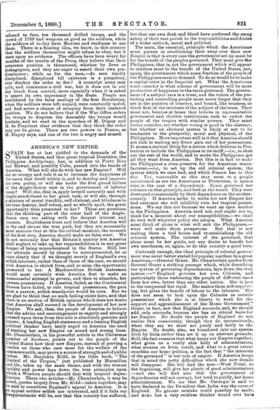TOPICS OF THE DAY.
IS REVOLUTION COMING IN FRANCE ?
WE must just say what we have to say, and if any one accuses us of sensation-mongering, must put up with it until the event proves or disproves the accuracy
of our forebodings. It is our sincere belief that a great event is immediately at hand in France. How any one can study the action and the words of the French Govern- ment without seeing that Ministers either expect a military coup d'etat, or are filled with fear lest a military coup d'etat
should occur, we are unable to imagine. Just look quietly at the facts, we do not mean the facts as they appear to M. de Pressense or Mr. Conybeare, but the facts admitted on all bands. For two years past, from good motives or bad motives, in the interests of the traditions of the Army—that is, of the right of the Army to govern itself without interference—or in their own interests, the French War Office has endeavoured to stifle all inquiry into the sentence passed on Captain Dreyfus, an officer accused of selling military secrets. For this end it has threatened four successive Governments, has openly bullied Courts of Justice, and if it has not, as its enemies allege, " re- moved " one of its own trusted officers because he confessed to forgery, it has provided him with the means of com- mitting suicide. It has, in fact, shown that it considers itself a separate power in the State responsible only to its own laws, and is determined to go any length rather than descend from that position. The main obstacle to its policy is Colonel Picquart, an officer formerly in the War Office itself, of the highest character and complete devotion to his profession, who, believing Captain Dreyfus to be innocent, determined to use his know- ledge to obtain a revision of his trial. For this treachery to itself, as the War Office considers it, he has been persecuted with savage malignity, has been deprived of his appointments, has been ordered to a dangerous frontier station in Tunis with insufficent sup- port, and has finally been expelled the Army. This not proving sufficient, for Colonel Picquart is a determined man, an attempt was made to poison his evidence by accusing him of having forged one of the documents in the Dreyfus case, and of revealing military secrets. On these charges he is to be brought before a Court- Martial, and, if found guilty, will suffer an exemplary sentence, which, in French opinion, will deprive his statements, whether in the Court of Cassation or else- where, of all their value. He has, moreover, been arrested and kept in solitary confinement for two months, a proceeding which would be avoided in the case of a common soldier charged with mutiny or murder. This persecution, and especially the early date fixed for the Court-Martial, revolted all educated opinion in France. Colonel Picquart was universally acquitted of any offence, except possibly of over-free speech to his own counsel, and a most earnest demand was made on the Govern- ment, backed by thousands of the best men in France, to postpone the Colonel's trial until the Court of Cassa- tion had given a final decision in the Dreyfus case. If that decision were in favour of the condemned man the charge of forgery would drop to the ground of itself, and in any case Colonel Picquart's evidence was neces- sary to a fair decision. There is no doubt, we should add, of the legal power of the Government, for although it cannot interfere with a Court-Martial, that being regarded as a Court of Justice, the fixing of the date is a purely administrative act as to which the Minister of War is General Zurlinden's superior officer.
Now, what did the Government do ? It refused bluntly to alter the date of the Court-Martial. M. Dupuy, the Premier, and M. de Freycinet, the Minister of War, both stated distinctly, in their places, that the administrative powers of great officers, and the powers of Courts of Justice, were so mixed up that the Department could not cancel General Zurlinden's order ; but that the Court of Cassation, if it pleased, could call for papers essential to the trial of Colonel Picquart, and thus, as it were, automatically arrest or postpone the trial of that officer. Those papers, whatever they were or whatever they might contain, should instantly be placed at the Court's disposal. M. Dupuy, as head of the Government, added that even if the Chamber ordered the date of Colonel
Picquart's trial to be unfixed "the Government would not comply," thus making of the question one of con- fidence upon which the Ministry would resign. The Chamber, though visibly excited and annoyed, responded to this hint at once, and by 437 to 73 passed to the Order of the Day. On the same day M. Dupuy, meeting a corre- spondent of the Figaro, admitted to him that he thought the situation most dangerous, though he still had con- fidence " in the vitality of the country ; " adding :—" We have been living for twenty-eight years upon a pious mis. understanding, and it is surprising that it can have lasted so long. We have placed side by side an army and a democracy. Now it is only too true that these two institutions have as their foundation contradictory principles. If you weaken the army you imperil' national independence; if you maintain its traditions and rights civil society takes fright on behalf of liberty. It is the torment of the present generation to be thus pulled hither and thither between these two opposite ideals. We are attached to liberty, but we are bound to maintain the security of the Fatherland; it is the most sacred of duties." Can a transac- tion have a clearer meaning ? M. Dupuy perceives clearly that the civil power and the military power are in France co-ordinate forces, which by instinct are opposed to one another ; he sees that a collision is approaching, and instead of facing it boldly he seeks to stave it off by concessions to the military power. So sure are he and his colleague, M. de Freycinet—who is, be it remembered, a civilian who acquired repute with the Army while governing it as dictator during the German War—that General Zurlinden would resist an order unfixing the date of the Picquart trial, that they dared not give it, and preferred, with a caution most unusual among French Ministers, who love their independent powers, to screen themselves behind the Court of Cassation, which again is in no way bound to act upon their hints. In other words, they believed that if they irritated the officer commanding the garrison oS Paris too much, especially upon a subject involving the amour propre of the Army, a coup d'itat would be struck, and the Republic, " having dishonoured the French Army, and proved itself incompetent to deal with the grave situation," would be destroyed. If this were not his fear, why in the world should the French Premier have hesi- tated to proclaim to all mankind the supremacy in France of the civil power, either by removing General Zurlinden from his command, or by postponing the trial of Colonel Picquart, whom he knows perfectly well, having had all the documents in his hands, to be an innocent and oppressed man ? Would M. Faure have refused his signature ? Possibly ; but in that case M. Dupuy's duty was to have resigned, stating his reason, and to have seen who, under such conditions, would accept a position so mocked with the name of power. M. Dupuy is an honour,. able man, a brave man, and a man with a tendency to masterfulness ; and we do not believe that he displayed this weakness out of any fear either for himself or for his own future. He feared not for France, which, as he says, has a vitality of her own, but for the Republic, to which he is devoted, and which it is his duty to defend. The Republic is in danger of being swept away by military force ; and in his deliverance to the reporter of the Figaro he called the attention of all Frenchmen to that fact. Premiers do not talk of the Army of the State as a power inconsistent with its institutions unless they are either fools—and M. Dupuy is the most sensible of mankind— or they are reduced nearly to despair by a danger which they foresee.
But, we shall be asked, how can General Zurlinden overthrow the Republic ? By proclaiming its successor, and declaring that any one who resists that decree until a plebiscite has been taken shall be shot upon the street. Who is to resist him ? M. Faure ? He will be under arrest or at the head of the new movement. The Assembly ? It will be flying to the provinces, its com- ponents but too rejoiced if they are not in danger of Cayenne. The people ? The people will probably be delighted, for they are sick of a Republic without suc- cesses ; and if they are refractory, what can they do ? General Zurlinden holds the forts, he commands a garri- son of sixty thousand men, and he can close every depot from which the people could obtain weapons of precision. The crowd of 1789 could not have faced, and indeed refused to face, ten thousand drilled troops, and the crowd of 1789 had weapons as good as the soldiers, while the soldiers of to-day have Maxims and readiness to use them. There is a floating idea, we know, in this country that the soldiers themselves might refuse to obey, but it rests upon no evidence. The officers have been weary for months of the insults of the Press, they believe that their corporate position is threatened, whether by Jews or demagogues, and they are eager to assert their own pre- dominance ; while as for the men,—do men rigidly disciplined, disciplined till existence is a purgatory, ever disobey the order to fire ? A conscript army may split, and commence a civil war, but it does not in our day break from control, more especially when it is asked to assert its own supremacy in the State. People are bewildered by the false analogy of the first Revolution, when the soldiers were left unpaid, were constantly unfed, and had never a chance of escaping from their enslaved position. We do not believe that if the War Office orders the troops to disperse the Assembly the troops would hesitate, and we read in the speeches of M. Dupuy and M. de Freycinet clear evidence that they think the order may yet be given. There are two powers in France, as M. Dupuy says, and one of the two is angry and armed.























































 Previous page
Previous page